Module 3 Making plans.全模块教案
文档属性
| 名称 | Module 3 Making plans.全模块教案 | 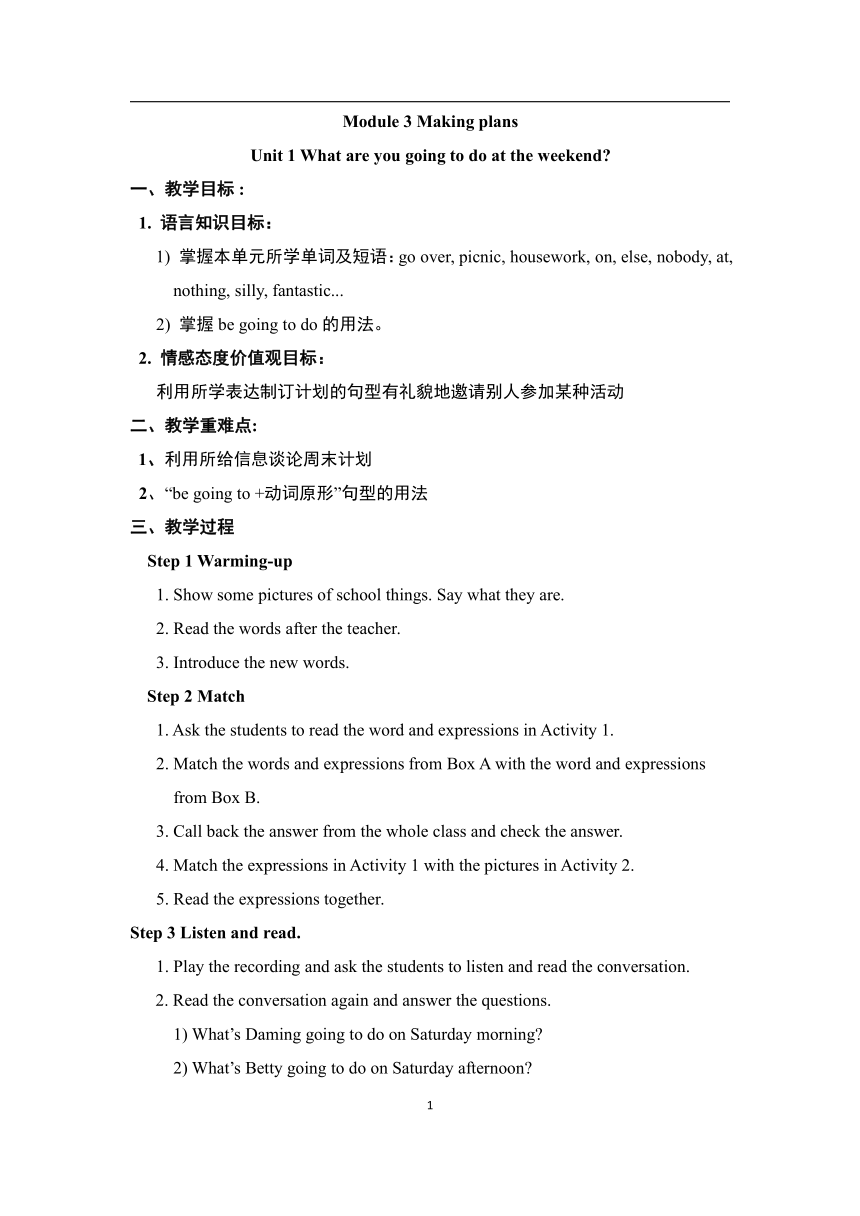 | |
| 格式 | zip | ||
| 文件大小 | 16.8KB | ||
| 资源类型 | 教案 | ||
| 版本资源 | 外研版 | ||
| 科目 | 英语 | ||
| 更新时间 | 2018-01-20 17:55:52 | ||
图片预览

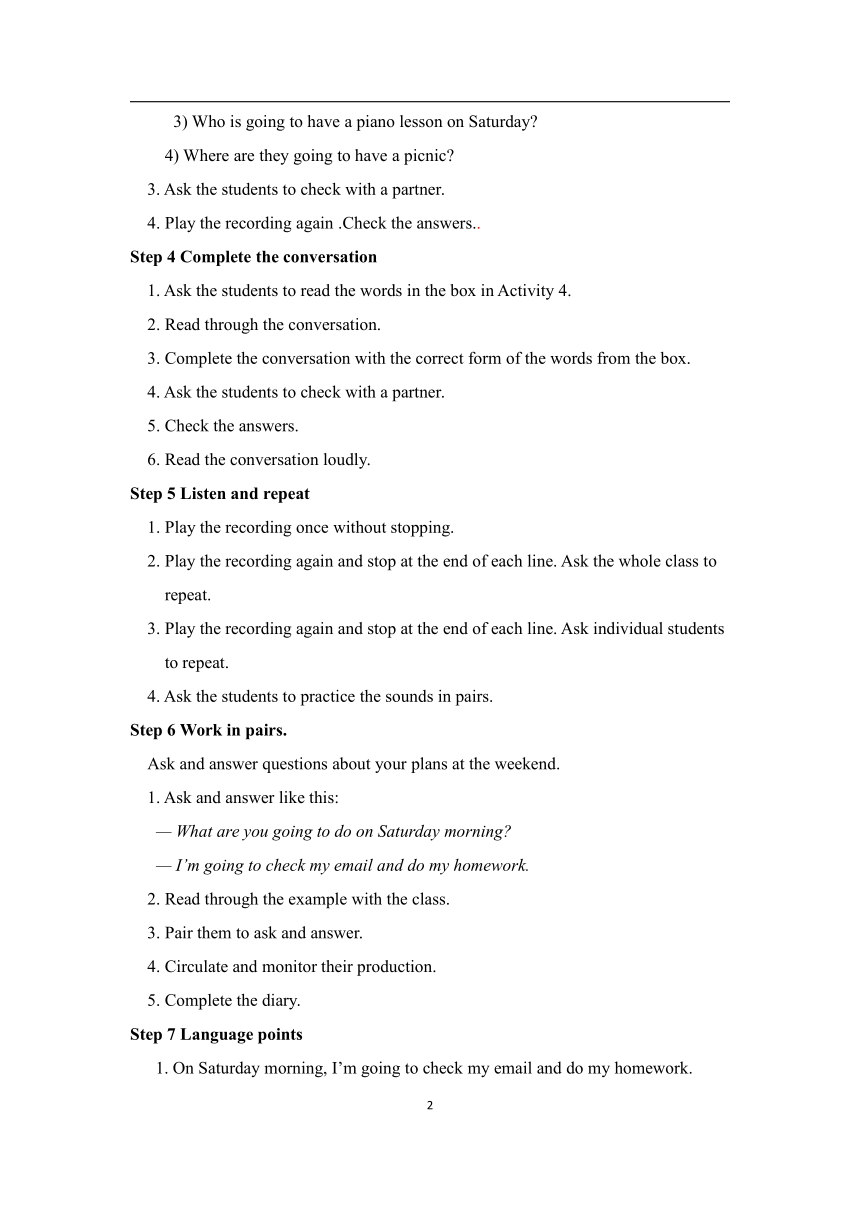
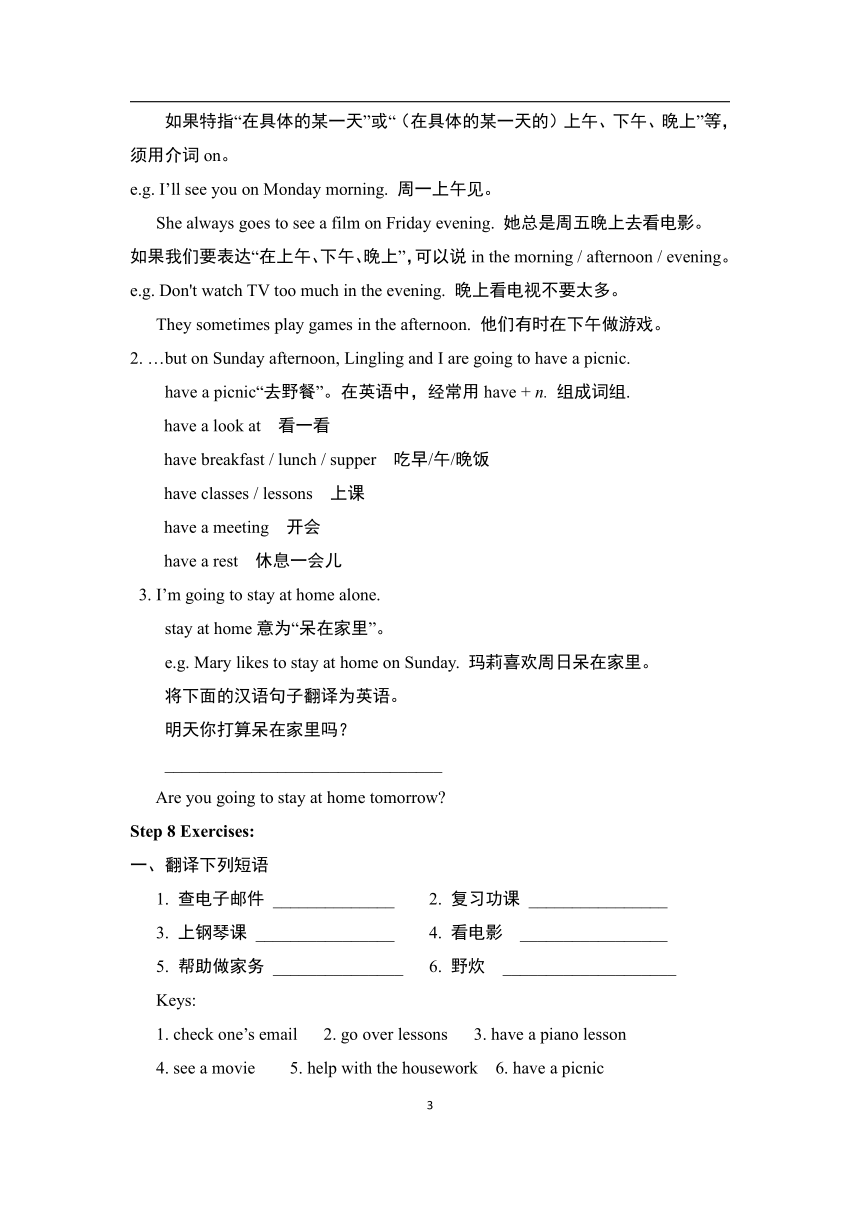
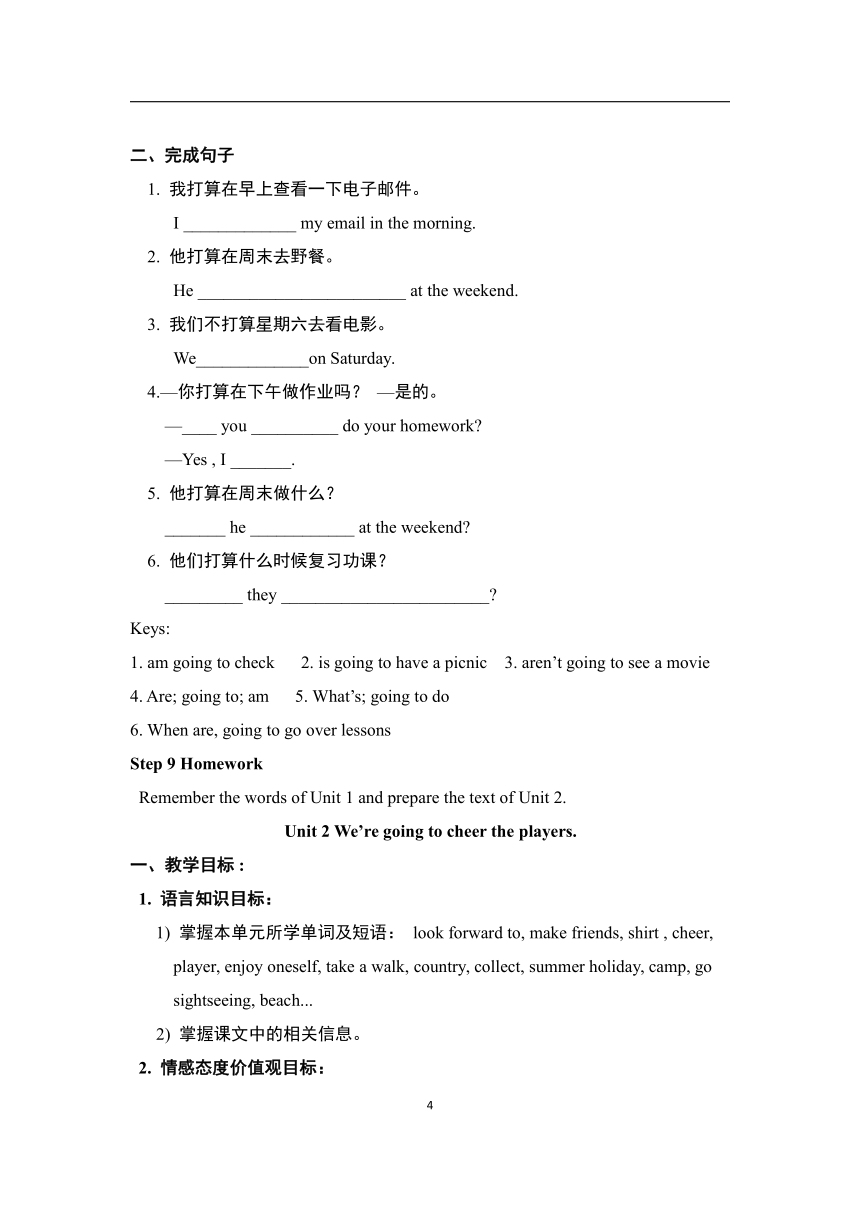
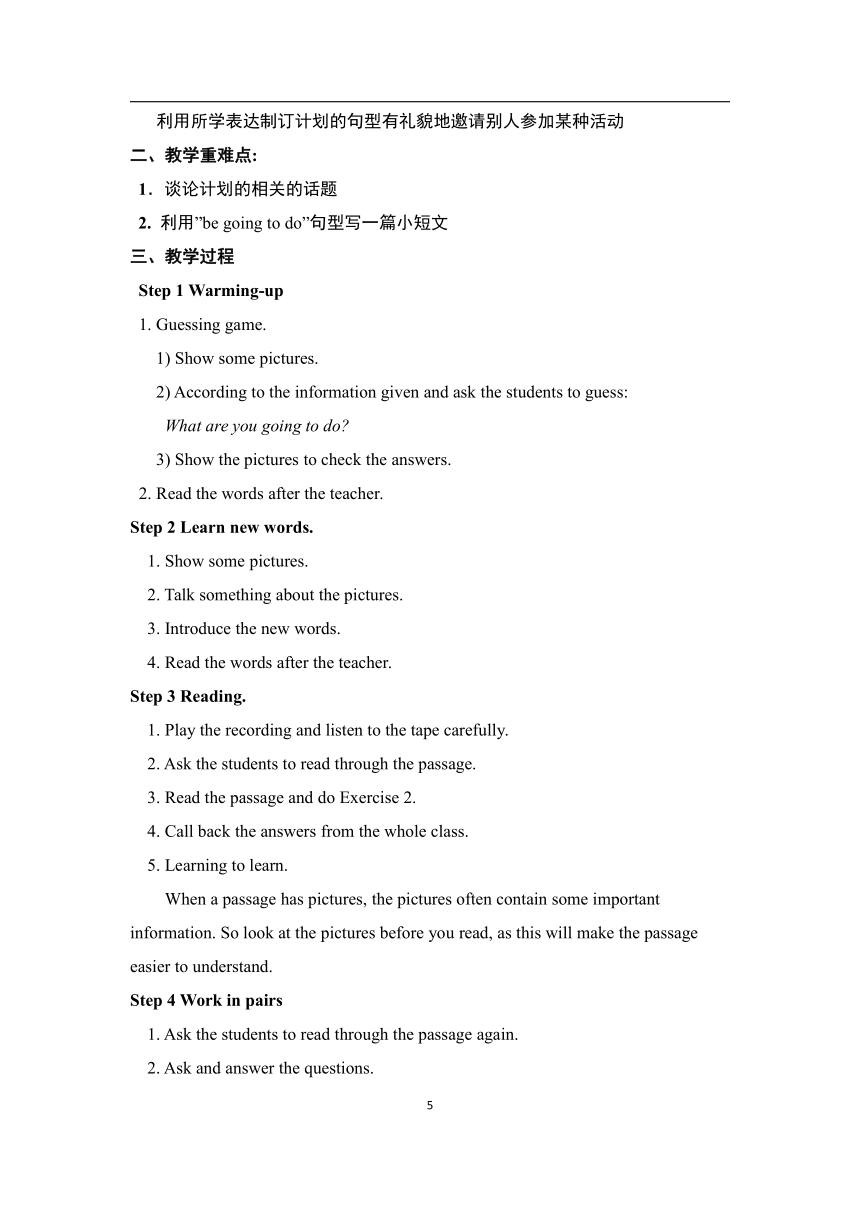
文档简介
Module
3
Making
plans
Unit
1
What
are
you
going
to
do
at
the
weekend
一、教学目标 :
1.
语言知识目标:
1)
掌握本单元所学单词及短语:go
over,
picnic,
housework,
on,
else,
nobody,
at,
nothing,
silly,
fantastic...
2)
掌握be
going
to
do的用法。
2.
情感态度价值观目标:
利用所学表达制订计划的句型有礼貌地邀请别人参加某种活动
二、教学重难点:
1、利用所给信息谈论周末计划
2、“be
going
to
+动词原形”句型的用法
三、教学过程
Step
1
Warming-up
1.
Show
some
pictures
of
school
things.
Say
what
they
are.
2.
Read
the
words
after
the
teacher.
3.
Introduce
the
new
words.
Step
2
Match
1.
Ask
the
students
to
read
the
word
and
expressions
in
Activity
1.
2.
Match
the
words
and
expressions
from
Box
A
with
the
word
and
expressions
from
Box
B.
3.
Call
back
the
answer
from
the
whole
class
and
check
the
answer.
4.
Match
the
expressions
in
Activity
1
with
the
pictures
in
Activity
2.
5.
Read
the
expressions
together.
Step
3
Listen
and
read.
1.
Play
the
recording
and
ask
the
students
to
listen
and
read
the
conversation.
2.
Read
the
conversation
again
and
answer
the
questions.
1)
What’s
Daming
going
to
do
on
Saturday
morning
2)
What’s
Betty
going
to
do
on
Saturday
afternoon
3)
Who
is
going
to
have
a
piano
lesson
on
Saturday
4)
Where
are
they
going
to
have
a
picnic
3.
Ask
the
students
to
check
with
a
partner.
4.
Play
the
recording
again
.Check
the
answers..
Step
4
Complete
the
conversation
1.
Ask
the
students
to
read
the
words
in
the
box
in
Activity
4.
2.
Read
through
the
conversation.
3.
Complete
the
conversation
with
the
correct
form
of
the
words
from
the
box.
4.
Ask
the
students
to
check
with
a
partner.
5.
Check
the
answers.
6.
Read
the
conversation
loudly.
Step
5
Listen
and
repeat
1.
Play
the
recording
once
without
stopping.
2.
Play
the
recording
again
and
stop
at
the
end
of
each
line.
Ask
the
whole
class
to
repeat.
3.
Play
the
recording
again
and
stop
at
the
end
of
each
line.
Ask
individual
students
to
repeat.
4.
Ask
the
students
to
practice
the
sounds
in
pairs.
Step
6
Work
in
pairs.
Ask
and
answer
questions
about
your
plans
at
the
weekend.
1.
Ask
and
answer
like
this:
—
What
are
you
going
to
do
on
Saturday
morning
—
I’m
going
to
check
my
email
and
do
my
homework.
2.
Read
through
the
example
with
the
class.
3.
Pair
them
to
ask
and
answer.
4.
Circulate
and
monitor
their
production.
5.
Complete
the
diary.
Step
7
Language
points
1.
On
Saturday
morning,
I’m
going
to
check
my
email
and
do
my
homework.
如果特指“在具体的某一天”或“(在具体的某一天的)上午、下午、晚上”等,须用介词on。
e.g.
I’ll
see
you
on
Monday
morning.
周一上午见。
She
always
goes
to
see
a
film
on
Friday
evening.
她总是周五晚上去看电影。
如果我们要表达“在上午、下午、晚上”,可以说in
the
morning
/
afternoon
/
evening。e.g.
Don't
watch
TV
too
much
in
the
evening.
晚上看电视不要太多。
They
sometimes
play
games
in
the
afternoon.
他们有时在下午做游戏。
2.
…but
on
Sunday
afternoon,
Lingling
and
I
are
going
to
have
a
picnic.
have
a
picnic“去野餐”。在英语中,经常用have
+
n.
组成词组.
have
a
look
at
看一看
have
breakfast
/
lunch
/
supper
吃早/午/晚饭
have
classes
/
lessons
上课
have
a
meeting
开会
have
a
rest
休息一会儿
3.
I’m
going
to
stay
at
home
alone.
stay
at
home意为“呆在家里”。
e.g.
Mary
likes
to
stay
at
home
on
Sunday.
玛莉喜欢周日呆在家里。
将下面的汉语句子翻译为英语。
明天你打算呆在家里吗?
________________________________
Are
you
going
to
stay
at
home
tomorrow
Step
8
Exercises:
一、翻译下列短语
1.
查电子邮件
______________
2.
复习功课
________________
3.
上钢琴课
________________
4.
看电影
_________________
5.
帮助做家务
_______________
6.
野炊
____________________
Keys:
1.
check
one’s
email
2.
go
over
lessons
3.
have
a
piano
lesson
4.
see
a
movie
5.
help
with
the
housework
6.
have
a
picnic
二、完成句子
1.
我打算在早上查看一下电子邮件。
I
_____________
my
email
in
the
morning.
2.
他打算在周末去野餐。
He
________________________
at
the
weekend.
3.
我们不打算星期六去看电影。
We_____________on
Saturday.
4.—你打算在下午做作业吗?
—是的。
—____
you
__________
do
your
homework
—Yes
,
I
_______.
5.
他打算在周末做什么?
_______
he
____________
at
the
weekend
6.
他们打算什么时候复习功课?
_________
they
________________________
Keys:
1.
am
going
to
check
2.
is
going
to
have
a
picnic
3.
aren’t
going
to
see
a
movie
4.
Are;
going
to;
am
5.
What’s;
going
to
do
6.
When
are,
going
to
go
over
lessons
Step
9
Homework
Remember
the
words
of
Unit
1
and
prepare
the
text
of
Unit
2.
Unit
2
We’re
going
to
cheer
the
players.
一、教学目标 :
1.
语言知识目标:
1)
掌握本单元所学单词及短语:
look
forward
to,
make
friends,
shirt
,
cheer,
player,
enjoy
oneself,
take
a
walk,
country,
collect,
summer
holiday,
camp,
go
sightseeing,
beach...
2)
掌握课文中的相关信息。
2.
情感态度价值观目标:
利用所学表达制订计划的句型有礼貌地邀请别人参加某种活动
二、教学重难点:
1.谈论计划的相关的话题
2.
利用”be
going
to
do”句型写一篇小短文
三、教学过程
Step
1
Warming-up
1.
Guessing
game.
1)
Show
some
pictures.
2)
According
to
the
information
given
and
ask
the
students
to
guess:
What
are
you
going
to
do
3)
Show
the
pictures
to
check
the
answers.
2.
Read
the
words
after
the
teacher.
Step
2
Learn
new
words.
1.
Show
some
pictures.
2.
Talk
something
about
the
pictures.
3.
Introduce
the
new
words.
4.
Read
the
words
after
the
teacher.
Step
3
Reading.
1.
Play
the
recording
and
listen
to
the
tape
carefully.
2.
Ask
the
students
to
read
through
the
passage.
3.
Read
the
passage
and
do
Exercise
2.
4.
Call
back
the
answers
from
the
whole
class.
5.
Learning
to
learn.
When
a
passage
has
pictures,
the
pictures
often
contain
some
important
information.
So
look
at
the
pictures
before
you
read,
as
this
will
make
the
passage
easier
to
understand.
Step
4
Work
in
pairs
1.
Ask
the
students
to
read
through
the
passage
again.
2.
Ask
and
answer
the
questions.
1)
When
is
Martin
going
to
watch
a
football
match
2)
What
does
Martin
hope
3)
What
is
it
going
to
be
a
busy
holiday
for
Zhang
Sijia
4)
Why
is
this
summer
holiday
going
to
be
different
for
Lucy
5)
Who
is
Lucy
going
to
stay
with
3.
Call
back
the
answers
from
the
whole
class.
Step
5
Complete
the
passage.
1.
Ask
the
students
to
read
the
words
in
the
box
in
Activity
4.
2.
Ask
the
students
to
read
through
the
passage
in
Activity
4.
3.
Complete
the
passage
with
the
correct
form
of
the
words
from
the
box.
4.
Call
back
the
answers
from
the
whole
class.
Step
6
Writing.
1.
Look
at
the
question
and
answer.
—Why
is
Martin
looking
forward
to
tomorrow
—Martin
is
looking
forward
to
tomorrow
because
he
and
his
friends
are
going
to
watch
their
favourite
team
play
football.
2.
Now
write
answers
to
the
questions.
Use
because.
1)
Why
is
Zhang
Sijia
going
to
a
park
near
her
friend’s
house
2)
Why
is
this
summer
holiday
going
to
be
very
different
for
Lucy
3.
Work
in
pairs.
Ask
and
answer
the
questions.
1)
What
are
you
looking
forward
to
this
weekend
2)
What
are
you
going
to
do
3)
Why
are
you
going
to
do
it
Step
7
Language
Points
1.
I’m
looking
forward
to
the
football
match
tomorrow.
look
forward
to
“期待,盼望”,后面接名词或动名词(V-ing)。
e.g.
I’m
looking
forward
to
my
holiday.
我盼望着假期的到来。
The
children
are
looking
forward
to
visiting
Beijing.
孩子们期待着去北京游览。
思考:be
going
to和look
forward
to,
二者都以to结尾,但为什么be
going
to
后面跟动词原形,而look
forward
to
后面跟名词或动词 ing形式呢?
be
going
to中的to是动词不定式符号,所以后面跟动词原形;而look
forward
to中的to是介词,所以后面跟名词或动词 ing形式。
e.g.
Susan
is
going
to
visit
the
zoo.
Susan要去参观动物园。
I’m
looking
forward
to
visiting
the
zoo.
我期盼着去参观动物园。
2.
I’m
going
to
enjoy
myself
during
the
May
Day
holiday.
enjoy
oneself
“过得愉快”,相当于have
a
good
time.
e.g.
I
hope
you
enjoy
yourself
this
evening.
我希望你今晚过得愉快。
Step
8
Do
exercises:
一、翻译下列句子:
1.期望,盼望
______________
2.观看我们最喜爱的队______________
3.足球迷______________
4.交朋友______________
5.穿球队衫______________
6.为队员欢呼______________
7.玩得痛快______________
8.五一假期______________
9.起床______________
10.乡村散步______________
11.游泳______________
12.收垃圾______________
13.在公园______________
14.暑假______________
15.夏令营______________
16.澳大利亚家庭______________
17.说英语______________
18.观光______________
19.野炊______________
20.在沙滩上______________
Keys:
1.
look
forward
to
2.
watch
our
favourite
team
3.
football
fans
4.
make
friends.
5.
wear
the
team
shirt
6.
cheer
the
players
7.
enjoy
oneself
8.
May
Day
holiday
9.
get
up
10.
take
a
walk
in
the
country
11.
go
swimming
12.
collect
litter
13.
in
the
park
14.
summer
holiday
15.
a
summer
camp
16.
an
Australia
family
17.
speak
English
18.
go
sightseeing
19.
have
a
picnic
20.
on
the
beach
二、完成句子
1.
玛丽正期待参观长城。
Mary
____________________________
the
Great
Wall.
2.
汤姆打算在深圳交些新朋友。
Tom
_____________________________
in
Shenzhen..
3.
我妈妈打算今天下午去买衣服。
My
mother____________________
some
clothes
this
afternoon.
4.
我打算明天早上早起。
I
_______________________
tomorrow
morning.
5.
这个周末我要去上钢琴课.
I
____________________
a
piano
lesson
this
weekend.
6.
你为什么打算呆在家里
______________
you
_________________
at
home
7.
我们打算暑假去澳大利亚去观光。
We
_________________
in
Australia
this
summer
holiday.
8.
五一他们打算去公园捡垃圾。
_______
May
Day
they_______________________
in
the
park.
Keys:
1.
is
looking
forward
to
visiting
2.
is
going
to
make
new
friends
3.
is
going
to
buy
4.
am
going
to
get
up
early.
5.
am
going
to
have
a
piano
lesson
6.
Why
are
;
going
to
stay
7.
are
going
to
go
sightseeing
8.
On
;are
going
to
collect
litter
Step
9
Homework
根据下列信息,写篇80字左右的文章。
家庭成员
劳动节计划
爸爸
洗车(wash
his
car),带我们去看爷爷奶奶(take...to...)。
妈妈
做家务,然后去购物,因为她想给我和哥哥买衣服。
哥哥
和同学去踢足球。
自己
和朋友去看电影,因为我太喜欢看电影了。
My
plan
on
May
Day
____________________________________________________________________________________________________________________________________________________________________________________________________________________________________________________________________________________
Unit
3
Language
in
use
一、教学目标 :
1.
语言知识目标:
1)
掌握本模块所学单词及短语
2)
利用所学知识谈论计划,制订计划。
2.
情感态度价值观目标:
清楚并正确地向别人表达自己的计划
二、教学重难点:
be
going
to的各种句型结构及用法
三、教学过程
Step
1
Revision
Show
some
pictures
to
review
the
text
of
Unit
1
and
Unit
2.
Step
2
Language
practice
1.
Read
through
the
example
sentences
in
the
box
with
the
whole
class.
2.
Ask
the
students
to
repeat
the
sentences
in
the
box.
Step
3
Grammar
be
going
to
的用法
一、be
going
to
的基本用法
be
going
to
是一种固定结构,它后面要接动词原形,用来表示按计划或安排要发生的动作,有时也可以表示推测将要或肯定会发生的动作,有“准备;打算”的意思。含有be
going
to
结构的句子中往往有表示将来的时间状语。
e.g.
We
are
going
to
see
a
movie
this
afternoon.
今天下午我们打算去看电影。(表安排)
Look
at
the
black
clouds.
It's
going
to
rain.
看那些乌云,快要下雨了。(表推测)
二、be
going
to
在肯定句中的形式
be
going
to
结构中的助动词be很少用原形,它一般有三种形式,即:am
,
is
,
are。be动词随主语的变化而变化。
e.g.
I
am
going
to
buy
something
tomorrow
morning.
明天早上我要去买些东西。
She
is
going
to
see
Mr.
Wang
this
afternoon.
她打算今天下午去看望王先生。
三、含be
going
to
的句子变否定句和一般疑问句很容易,即在be
(am,
is,
are)
的后面加上not
就构成了否定句;把be
(am,
is,
are)
放到句首,在句末加问号就构成了一般疑问句。其答语为:Yes,
主语+
am/is/are.
/
No,
主语+
isn't/aren't.
/
No,
I'm
not.不过
I
am...
在改为一般疑问句时常常改为“Are
you
.... ”。
e.g.
They
are
going
to
have
a
picnic
this
Sunday.
(肯定句)
They
are
not
going
to
have
a
picnic
this
Sunday.
(否定句)
—Are
they
going
to
have
a
picnic
this
Sunday
—Yes,
they
are.
/No,
they
aren't.
(一般疑问句及其回答)
四、使用be
going
to
应注意的两点
1.There
be
句型的be
going
to
结构为:There
is
/
are
going
to
be...
(注意句型中going
to
后面的be不能改为have)
,常用来表示将有某事发生。
e.g.
There
is
going
to
be
a
football
match
next
Saturday
in
our
school.
下周六我们学校将有一场足球比赛。
2.come,
go,
leave,
arrive等表示位置移动的动词常用现在进行时表示将要发生的动作,它们很少与be
going
to
结构连用。
e.g.
Miss
Sun
is
coming
tonight.今晚孙小姐要来。
Step
4
Work
in
pairs
1.
Show
some
pictures.
2.
Ask
the
students
to
look
at
the
pictures
carefully.
3.
Ask
and
answer
like
this:
—What
are
you
going
to
do
on
Saturday
morning
—On
Saturday
morning
I’m
going
to…
4.
Ask
the
students
to
look
at
the
table
in
Activity
1.
5.
Ask
and
answer
questions
about
Saturday
and
Sunday
plans.
6.
Pair
them
to
ask
and
answer.
7.
Circulate
and
monitor
their
production.
Step
5
Complete
the
sentences.
1.
Ask
the
students
to
read
the
words
and
expression
in
the
box
in
Activity
2.
2.
Read
through
the
sentences.
1)
We
are
going
to
____________
a
movie
this
weekend.
2)
They
are
going
to
_____________
football
on
Sunday.
3)
Betty
wants
to
go
shopping.
She’s
going
to
___________
some
clothes.
4)
I’m
going
to
___________
a
piano
lesson
on
Saturday
morning.
5)
Daming
isn’t
going
to
____________
in
bed
on
Sunday
morning.
He’s
going
to
____________
early.
6)
Lingling
wants
to
go
for
a
walk.
She’s
going
to
___________
in
the
park.
7)
Tony
is
going
to
__________
to
a
summer
camp
during
the
summer
holiday.
He’s
going
to
______________
a
lot
of
friends
and
have
fun.
3.
Complete
the
sentences
with
the
correct
form
of
the
words
and
expression
from
the
box.
4.
Check
the
answers:
Step
6
Exercises
1.
Put
the
words
in
the
correct
order
to
make
questions.
1)
check
/
you
/
going
/
are
/
to
/
email
/
you
/
2)
they
/
on
/
in
/
park
/
are
/
going
/
to/
Sunday
/
litter
/
collect
/
the
/
3)
some
/
going
/
is
/
new
/
buy
/
Betty
/
to
/
clothes
4)
this
/
a
/
you
/
see
/
going
/
are
/
to
/
movie
/
evening
/
5)
computer
/
Tony
/
to
/play
/
a
/
is
/
going
/
game
/
2.
Ask
the
students
to
check
with
a
partner.
3.
Check
the
answers:
4.
Now
complete
the
answers
to
the
questions.
Use
short
forms.
1)
Yes,
I
_________.
4)
No,
we
____________.
2)
Yes,
they
_________.
5)
Yes,
he
____________.
3
)
__________,
she
isn’t.
5.
Check
the
answers:
Step
7
Around
the
world:
Weekend
plans
1.
Ask
the
students
to
look
at
the
picture
and
discuss
what
they
can
see.
2.
Read
through
the
information
with
the
whole
class.
3.
Complete
the
table.
Young
people
in
the
UK
Saturday
morning
1.
__________________________________
Saturday
afternoon
2.
__________________________________
Sunday
morning
3.
__________________________________
Sunday
afternoon
4.
__________________________________
Sunday
evening
5.
__________________________________
4.
Ask
the
students
to
check
with
a
partner.
5.
Check
the
answers:
Step
8
Module
task:
Talking
about
your
weekend
plans
1.Work
in
groups
of
three.
Talk
about
what
you’re
going
to
do
at
the
weekend.
A:
What
are
you
going
to
do
at
the
weekend
B:
I’m
going
to
…(to
C
)
What
about
you
C:
I’m
going
to…
2.
Now
write
down
your
ideas.
3.
Make
plans
to
do
things
together
with
the
others
in
your
group.
Make
a
group
diary
for
next
weekend.
Saturday
morning
Sunday
morning
Saturday
afternoon
Sunday
afternoon
Saturday
evening
Sunday
evening
Step
9
Homework
Talk
about
your
group
diary
to
the
whole
class
and
write
it
down.
On…
we
are
going
to…
_____________________________________________
_______________________________________________________________________________________________________________________________________________________________________________________________________________
11
3
Making
plans
Unit
1
What
are
you
going
to
do
at
the
weekend
一、教学目标 :
1.
语言知识目标:
1)
掌握本单元所学单词及短语:go
over,
picnic,
housework,
on,
else,
nobody,
at,
nothing,
silly,
fantastic...
2)
掌握be
going
to
do的用法。
2.
情感态度价值观目标:
利用所学表达制订计划的句型有礼貌地邀请别人参加某种活动
二、教学重难点:
1、利用所给信息谈论周末计划
2、“be
going
to
+动词原形”句型的用法
三、教学过程
Step
1
Warming-up
1.
Show
some
pictures
of
school
things.
Say
what
they
are.
2.
Read
the
words
after
the
teacher.
3.
Introduce
the
new
words.
Step
2
Match
1.
Ask
the
students
to
read
the
word
and
expressions
in
Activity
1.
2.
Match
the
words
and
expressions
from
Box
A
with
the
word
and
expressions
from
Box
B.
3.
Call
back
the
answer
from
the
whole
class
and
check
the
answer.
4.
Match
the
expressions
in
Activity
1
with
the
pictures
in
Activity
2.
5.
Read
the
expressions
together.
Step
3
Listen
and
read.
1.
Play
the
recording
and
ask
the
students
to
listen
and
read
the
conversation.
2.
Read
the
conversation
again
and
answer
the
questions.
1)
What’s
Daming
going
to
do
on
Saturday
morning
2)
What’s
Betty
going
to
do
on
Saturday
afternoon
3)
Who
is
going
to
have
a
piano
lesson
on
Saturday
4)
Where
are
they
going
to
have
a
picnic
3.
Ask
the
students
to
check
with
a
partner.
4.
Play
the
recording
again
.Check
the
answers..
Step
4
Complete
the
conversation
1.
Ask
the
students
to
read
the
words
in
the
box
in
Activity
4.
2.
Read
through
the
conversation.
3.
Complete
the
conversation
with
the
correct
form
of
the
words
from
the
box.
4.
Ask
the
students
to
check
with
a
partner.
5.
Check
the
answers.
6.
Read
the
conversation
loudly.
Step
5
Listen
and
repeat
1.
Play
the
recording
once
without
stopping.
2.
Play
the
recording
again
and
stop
at
the
end
of
each
line.
Ask
the
whole
class
to
repeat.
3.
Play
the
recording
again
and
stop
at
the
end
of
each
line.
Ask
individual
students
to
repeat.
4.
Ask
the
students
to
practice
the
sounds
in
pairs.
Step
6
Work
in
pairs.
Ask
and
answer
questions
about
your
plans
at
the
weekend.
1.
Ask
and
answer
like
this:
—
What
are
you
going
to
do
on
Saturday
morning
—
I’m
going
to
check
my
and
do
my
homework.
2.
Read
through
the
example
with
the
class.
3.
Pair
them
to
ask
and
answer.
4.
Circulate
and
monitor
their
production.
5.
Complete
the
diary.
Step
7
Language
points
1.
On
Saturday
morning,
I’m
going
to
check
my
and
do
my
homework.
如果特指“在具体的某一天”或“(在具体的某一天的)上午、下午、晚上”等,须用介词on。
e.g.
I’ll
see
you
on
Monday
morning.
周一上午见。
She
always
goes
to
see
a
film
on
Friday
evening.
她总是周五晚上去看电影。
如果我们要表达“在上午、下午、晚上”,可以说in
the
morning
/
afternoon
/
evening。e.g.
Don't
watch
TV
too
much
in
the
evening.
晚上看电视不要太多。
They
sometimes
play
games
in
the
afternoon.
他们有时在下午做游戏。
2.
…but
on
Sunday
afternoon,
Lingling
and
I
are
going
to
have
a
picnic.
have
a
picnic“去野餐”。在英语中,经常用have
+
n.
组成词组.
have
a
look
at
看一看
have
breakfast
/
lunch
/
supper
吃早/午/晚饭
have
classes
/
lessons
上课
have
a
meeting
开会
have
a
rest
休息一会儿
3.
I’m
going
to
stay
at
home
alone.
stay
at
home意为“呆在家里”。
e.g.
Mary
likes
to
stay
at
home
on
Sunday.
玛莉喜欢周日呆在家里。
将下面的汉语句子翻译为英语。
明天你打算呆在家里吗?
________________________________
Are
you
going
to
stay
at
home
tomorrow
Step
8
Exercises:
一、翻译下列短语
1.
查电子邮件
______________
2.
复习功课
________________
3.
上钢琴课
________________
4.
看电影
_________________
5.
帮助做家务
_______________
6.
野炊
____________________
Keys:
1.
check
one’s
2.
go
over
lessons
3.
have
a
piano
lesson
4.
see
a
movie
5.
help
with
the
housework
6.
have
a
picnic
二、完成句子
1.
我打算在早上查看一下电子邮件。
I
_____________
my
in
the
morning.
2.
他打算在周末去野餐。
He
________________________
at
the
weekend.
3.
我们不打算星期六去看电影。
We_____________on
Saturday.
4.—你打算在下午做作业吗?
—是的。
—____
you
__________
do
your
homework
—Yes
,
I
_______.
5.
他打算在周末做什么?
_______
he
____________
at
the
weekend
6.
他们打算什么时候复习功课?
_________
they
________________________
Keys:
1.
am
going
to
check
2.
is
going
to
have
a
picnic
3.
aren’t
going
to
see
a
movie
4.
Are;
going
to;
am
5.
What’s;
going
to
do
6.
When
are,
going
to
go
over
lessons
Step
9
Homework
Remember
the
words
of
Unit
1
and
prepare
the
text
of
Unit
2.
Unit
2
We’re
going
to
cheer
the
players.
一、教学目标 :
1.
语言知识目标:
1)
掌握本单元所学单词及短语:
look
forward
to,
make
friends,
shirt
,
cheer,
player,
enjoy
oneself,
take
a
walk,
country,
collect,
summer
holiday,
camp,
go
sightseeing,
beach...
2)
掌握课文中的相关信息。
2.
情感态度价值观目标:
利用所学表达制订计划的句型有礼貌地邀请别人参加某种活动
二、教学重难点:
1.谈论计划的相关的话题
2.
利用”be
going
to
do”句型写一篇小短文
三、教学过程
Step
1
Warming-up
1.
Guessing
game.
1)
Show
some
pictures.
2)
According
to
the
information
given
and
ask
the
students
to
guess:
What
are
you
going
to
do
3)
Show
the
pictures
to
check
the
answers.
2.
Read
the
words
after
the
teacher.
Step
2
Learn
new
words.
1.
Show
some
pictures.
2.
Talk
something
about
the
pictures.
3.
Introduce
the
new
words.
4.
Read
the
words
after
the
teacher.
Step
3
Reading.
1.
Play
the
recording
and
listen
to
the
tape
carefully.
2.
Ask
the
students
to
read
through
the
passage.
3.
Read
the
passage
and
do
Exercise
2.
4.
Call
back
the
answers
from
the
whole
class.
5.
Learning
to
learn.
When
a
passage
has
pictures,
the
pictures
often
contain
some
important
information.
So
look
at
the
pictures
before
you
read,
as
this
will
make
the
passage
easier
to
understand.
Step
4
Work
in
pairs
1.
Ask
the
students
to
read
through
the
passage
again.
2.
Ask
and
answer
the
questions.
1)
When
is
Martin
going
to
watch
a
football
match
2)
What
does
Martin
hope
3)
What
is
it
going
to
be
a
busy
holiday
for
Zhang
Sijia
4)
Why
is
this
summer
holiday
going
to
be
different
for
Lucy
5)
Who
is
Lucy
going
to
stay
with
3.
Call
back
the
answers
from
the
whole
class.
Step
5
Complete
the
passage.
1.
Ask
the
students
to
read
the
words
in
the
box
in
Activity
4.
2.
Ask
the
students
to
read
through
the
passage
in
Activity
4.
3.
Complete
the
passage
with
the
correct
form
of
the
words
from
the
box.
4.
Call
back
the
answers
from
the
whole
class.
Step
6
Writing.
1.
Look
at
the
question
and
answer.
—Why
is
Martin
looking
forward
to
tomorrow
—Martin
is
looking
forward
to
tomorrow
because
he
and
his
friends
are
going
to
watch
their
favourite
team
play
football.
2.
Now
write
answers
to
the
questions.
Use
because.
1)
Why
is
Zhang
Sijia
going
to
a
park
near
her
friend’s
house
2)
Why
is
this
summer
holiday
going
to
be
very
different
for
Lucy
3.
Work
in
pairs.
Ask
and
answer
the
questions.
1)
What
are
you
looking
forward
to
this
weekend
2)
What
are
you
going
to
do
3)
Why
are
you
going
to
do
it
Step
7
Language
Points
1.
I’m
looking
forward
to
the
football
match
tomorrow.
look
forward
to
“期待,盼望”,后面接名词或动名词(V-ing)。
e.g.
I’m
looking
forward
to
my
holiday.
我盼望着假期的到来。
The
children
are
looking
forward
to
visiting
Beijing.
孩子们期待着去北京游览。
思考:be
going
to和look
forward
to,
二者都以to结尾,但为什么be
going
to
后面跟动词原形,而look
forward
to
后面跟名词或动词 ing形式呢?
be
going
to中的to是动词不定式符号,所以后面跟动词原形;而look
forward
to中的to是介词,所以后面跟名词或动词 ing形式。
e.g.
Susan
is
going
to
visit
the
zoo.
Susan要去参观动物园。
I’m
looking
forward
to
visiting
the
zoo.
我期盼着去参观动物园。
2.
I’m
going
to
enjoy
myself
during
the
May
Day
holiday.
enjoy
oneself
“过得愉快”,相当于have
a
good
time.
e.g.
I
hope
you
enjoy
yourself
this
evening.
我希望你今晚过得愉快。
Step
8
Do
exercises:
一、翻译下列句子:
1.期望,盼望
______________
2.观看我们最喜爱的队______________
3.足球迷______________
4.交朋友______________
5.穿球队衫______________
6.为队员欢呼______________
7.玩得痛快______________
8.五一假期______________
9.起床______________
10.乡村散步______________
11.游泳______________
12.收垃圾______________
13.在公园______________
14.暑假______________
15.夏令营______________
16.澳大利亚家庭______________
17.说英语______________
18.观光______________
19.野炊______________
20.在沙滩上______________
Keys:
1.
look
forward
to
2.
watch
our
favourite
team
3.
football
fans
4.
make
friends.
5.
wear
the
team
shirt
6.
cheer
the
players
7.
enjoy
oneself
8.
May
Day
holiday
9.
get
up
10.
take
a
walk
in
the
country
11.
go
swimming
12.
collect
litter
13.
in
the
park
14.
summer
holiday
15.
a
summer
camp
16.
an
Australia
family
17.
speak
English
18.
go
sightseeing
19.
have
a
picnic
20.
on
the
beach
二、完成句子
1.
玛丽正期待参观长城。
Mary
____________________________
the
Great
Wall.
2.
汤姆打算在深圳交些新朋友。
Tom
_____________________________
in
Shenzhen..
3.
我妈妈打算今天下午去买衣服。
My
mother____________________
some
clothes
this
afternoon.
4.
我打算明天早上早起。
I
_______________________
tomorrow
morning.
5.
这个周末我要去上钢琴课.
I
____________________
a
piano
lesson
this
weekend.
6.
你为什么打算呆在家里
______________
you
_________________
at
home
7.
我们打算暑假去澳大利亚去观光。
We
_________________
in
Australia
this
summer
holiday.
8.
五一他们打算去公园捡垃圾。
_______
May
Day
they_______________________
in
the
park.
Keys:
1.
is
looking
forward
to
visiting
2.
is
going
to
make
new
friends
3.
is
going
to
buy
4.
am
going
to
get
up
early.
5.
am
going
to
have
a
piano
lesson
6.
Why
are
;
going
to
stay
7.
are
going
to
go
sightseeing
8.
On
;are
going
to
collect
litter
Step
9
Homework
根据下列信息,写篇80字左右的文章。
家庭成员
劳动节计划
爸爸
洗车(wash
his
car),带我们去看爷爷奶奶(take...to...)。
妈妈
做家务,然后去购物,因为她想给我和哥哥买衣服。
哥哥
和同学去踢足球。
自己
和朋友去看电影,因为我太喜欢看电影了。
My
plan
on
May
Day
____________________________________________________________________________________________________________________________________________________________________________________________________________________________________________________________________________________
Unit
3
Language
in
use
一、教学目标 :
1.
语言知识目标:
1)
掌握本模块所学单词及短语
2)
利用所学知识谈论计划,制订计划。
2.
情感态度价值观目标:
清楚并正确地向别人表达自己的计划
二、教学重难点:
be
going
to的各种句型结构及用法
三、教学过程
Step
1
Revision
Show
some
pictures
to
review
the
text
of
Unit
1
and
Unit
2.
Step
2
Language
practice
1.
Read
through
the
example
sentences
in
the
box
with
the
whole
class.
2.
Ask
the
students
to
repeat
the
sentences
in
the
box.
Step
3
Grammar
be
going
to
的用法
一、be
going
to
的基本用法
be
going
to
是一种固定结构,它后面要接动词原形,用来表示按计划或安排要发生的动作,有时也可以表示推测将要或肯定会发生的动作,有“准备;打算”的意思。含有be
going
to
结构的句子中往往有表示将来的时间状语。
e.g.
We
are
going
to
see
a
movie
this
afternoon.
今天下午我们打算去看电影。(表安排)
Look
at
the
black
clouds.
It's
going
to
rain.
看那些乌云,快要下雨了。(表推测)
二、be
going
to
在肯定句中的形式
be
going
to
结构中的助动词be很少用原形,它一般有三种形式,即:am
,
is
,
are。be动词随主语的变化而变化。
e.g.
I
am
going
to
buy
something
tomorrow
morning.
明天早上我要去买些东西。
She
is
going
to
see
Mr.
Wang
this
afternoon.
她打算今天下午去看望王先生。
三、含be
going
to
的句子变否定句和一般疑问句很容易,即在be
(am,
is,
are)
的后面加上not
就构成了否定句;把be
(am,
is,
are)
放到句首,在句末加问号就构成了一般疑问句。其答语为:Yes,
主语+
am/is/are.
/
No,
主语+
isn't/aren't.
/
No,
I'm
not.不过
I
am...
在改为一般疑问句时常常改为“Are
you
.... ”。
e.g.
They
are
going
to
have
a
picnic
this
Sunday.
(肯定句)
They
are
not
going
to
have
a
picnic
this
Sunday.
(否定句)
—Are
they
going
to
have
a
picnic
this
Sunday
—Yes,
they
are.
/No,
they
aren't.
(一般疑问句及其回答)
四、使用be
going
to
应注意的两点
1.There
be
句型的be
going
to
结构为:There
is
/
are
going
to
be...
(注意句型中going
to
后面的be不能改为have)
,常用来表示将有某事发生。
e.g.
There
is
going
to
be
a
football
match
next
Saturday
in
our
school.
下周六我们学校将有一场足球比赛。
2.come,
go,
leave,
arrive等表示位置移动的动词常用现在进行时表示将要发生的动作,它们很少与be
going
to
结构连用。
e.g.
Miss
Sun
is
coming
tonight.今晚孙小姐要来。
Step
4
Work
in
pairs
1.
Show
some
pictures.
2.
Ask
the
students
to
look
at
the
pictures
carefully.
3.
Ask
and
answer
like
this:
—What
are
you
going
to
do
on
Saturday
morning
—On
Saturday
morning
I’m
going
to…
4.
Ask
the
students
to
look
at
the
table
in
Activity
1.
5.
Ask
and
answer
questions
about
Saturday
and
Sunday
plans.
6.
Pair
them
to
ask
and
answer.
7.
Circulate
and
monitor
their
production.
Step
5
Complete
the
sentences.
1.
Ask
the
students
to
read
the
words
and
expression
in
the
box
in
Activity
2.
2.
Read
through
the
sentences.
1)
We
are
going
to
____________
a
movie
this
weekend.
2)
They
are
going
to
_____________
football
on
Sunday.
3)
Betty
wants
to
go
shopping.
She’s
going
to
___________
some
clothes.
4)
I’m
going
to
___________
a
piano
lesson
on
Saturday
morning.
5)
Daming
isn’t
going
to
____________
in
bed
on
Sunday
morning.
He’s
going
to
____________
early.
6)
Lingling
wants
to
go
for
a
walk.
She’s
going
to
___________
in
the
park.
7)
Tony
is
going
to
__________
to
a
summer
camp
during
the
summer
holiday.
He’s
going
to
______________
a
lot
of
friends
and
have
fun.
3.
Complete
the
sentences
with
the
correct
form
of
the
words
and
expression
from
the
box.
4.
Check
the
answers:
Step
6
Exercises
1.
Put
the
words
in
the
correct
order
to
make
questions.
1)
check
/
you
/
going
/
are
/
to
/
/
you
/
2)
they
/
on
/
in
/
park
/
are
/
going
/
to/
Sunday
/
litter
/
collect
/
the
/
3)
some
/
going
/
is
/
new
/
buy
/
Betty
/
to
/
clothes
4)
this
/
a
/
you
/
see
/
going
/
are
/
to
/
movie
/
evening
/
5)
computer
/
Tony
/
to
/play
/
a
/
is
/
going
/
game
/
2.
Ask
the
students
to
check
with
a
partner.
3.
Check
the
answers:
4.
Now
complete
the
answers
to
the
questions.
Use
short
forms.
1)
Yes,
I
_________.
4)
No,
we
____________.
2)
Yes,
they
_________.
5)
Yes,
he
____________.
3
)
__________,
she
isn’t.
5.
Check
the
answers:
Step
7
Around
the
world:
Weekend
plans
1.
Ask
the
students
to
look
at
the
picture
and
discuss
what
they
can
see.
2.
Read
through
the
information
with
the
whole
class.
3.
Complete
the
table.
Young
people
in
the
UK
Saturday
morning
1.
__________________________________
Saturday
afternoon
2.
__________________________________
Sunday
morning
3.
__________________________________
Sunday
afternoon
4.
__________________________________
Sunday
evening
5.
__________________________________
4.
Ask
the
students
to
check
with
a
partner.
5.
Check
the
answers:
Step
8
Module
task:
Talking
about
your
weekend
plans
1.Work
in
groups
of
three.
Talk
about
what
you’re
going
to
do
at
the
weekend.
A:
What
are
you
going
to
do
at
the
weekend
B:
I’m
going
to
…(to
C
)
What
about
you
C:
I’m
going
to…
2.
Now
write
down
your
ideas.
3.
Make
plans
to
do
things
together
with
the
others
in
your
group.
Make
a
group
diary
for
next
weekend.
Saturday
morning
Sunday
morning
Saturday
afternoon
Sunday
afternoon
Saturday
evening
Sunday
evening
Step
9
Homework
Talk
about
your
group
diary
to
the
whole
class
and
write
it
down.
On…
we
are
going
to…
_____________________________________________
_______________________________________________________________________________________________________________________________________________________________________________________________________________
11
同课章节目录
- Module 1 Lost and found
- Unit 1 Whose bag is this?
- Unit 2 Are they yours?
- Unit 3 Language in use
- Module 2 What can you do ?
- Unit 1 I can play the piano
- Unit 2 I can run really fast
- Unit 3 Language in use
- Module 3 Making plans
- Unit 1 What are you going to do at the weekends?
- Unit 2 We're going to cheer the players.
- Unit 3 Language in use
- Module 4 Life in the future
- Unit 1 Everyone will study at home
- Unit 2 Every family will have a small plane.
- Unit 3 Language in use
- Module 5 Shopping
- Unit 1 What can I do for you?
- Unit 2 You can buy everything on the Internet
- Unit 3 Language in use
- Module 6 Around town
- Unit 1 Could you tell me how to get to the Nationa
- Unit 2 The London Eye is on your right.
- Unit 3 Language in use
- Revision module A
- Module 7 My past life
- Unit 1 I was born in a small village.
- Unit 2 I was born in Quincy.
- Unit 3 Language in use
- Module 8 Story time
- Unit 1 Once upon a time….
- Unit 2 Goldilocks hurried out of the house.
- Unit 3 Language in use
- Module 9 Life history
- Unit 1 He left school and began work at the age of
- Unit 2 He decided to be an actor.
- Unit 3 Language in use
- Module 10 A holiday journey
- Unit 1 What did you do?
- Unit 2 This morning we took a walk.
- Unit 3 Language in use
- Module 11 Body language
- Unit 1 They touch noses!
- Unit 2 Here are some ways to welcome them.
- Unit 3 Language in use
- Module 12 Western music
- Unit 1 It's so beautiful!
- Unit 2 Vienna is the centre of European classical
- Unit 3 Language in use
- Revision module B
